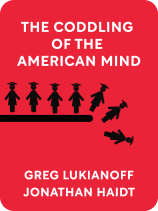

This article is an excerpt from the Shortform book guide to "The Coddling of the American Mind" by Greg Lukianoff and Jonathan Haidt. Shortform has the world's best summaries and analyses of books you should be reading.
Like this article? Sign up for a free trial here .
In what ways are speech codes reshaping academic life? Why are professors teaching in an atmosphere of intimidation?
In their book, The Coddling of the American Mind, Jonathan Haidt and Greg Lukianoff argue that speech codes in universities are damaging free speech on campus. The authors say that college professors are constantly in fear of saying anything wrong or offending a student and so their ability to teach is being impacted.
Keep reading to learn more about the dangers of university speech codes.
University Speech Codes
The corporatization of university life, the interests of university administrators, and the growing fragility and entitlement of today’s students all combine to create an atmosphere on campus that is highly threatening to academic freedom.
Because colleges increasingly fear being sued by students who claim to have been offended by something a student or professor said to them or by something they may have been assigned in class, administrators have promulgated onerous campus “speech codes” that define what ideas and modes of expression are and are not acceptable.
These codes are deeply damaging to free speech on campus and frequently lead to instances of overreaction to and overregulation of ideas. One professor at Oakton Community College who sent an innocuous email to fellow faculty members urging them to honor the struggle of workers on May Day was issued a cease-and-desist letter by the college. His offense? Merely referencing the violent 1886 Haymarket Square Riot in his email, which administrators believed constituted a veiled threat to the university president.
No Standards for “Offensive”
Speech codes also enshrine the kind of emotional reasoning we cautioned against in Chapter 2. Some codes include absurdly vague language, demanding that “no student shall offend anyone on university property.” “Offensive” is not defined by any objective standard, but is determined solely by the “victim.” If it bothers someone, it’s offensive, regardless of intent.
This closely mirrors the phenomenon we observed in Chapter 2 in which the definition of concepts like “trauma” have been watered down and subjectified to such a degree as to deprive them of any practical meaning or application. Moreover, the overhyping of the concept of “microaggressions” enhances students’ beliefs in their own fragility and gives them a low bar for what constitutes bias and/or aggression.
Teaching in Fear
While these speech codes may seem silly and nonsensical (and they are), one should not discount the ways in which they have profoundly reshaped academic life.
Professors now teach in an atmosphere of intimidation, in which using the wrong term or assigning a “problematic” work for students to analyze can lead to social sanction from fellow faculty; student boycotts of one’s class; and disciplinary action by the university, up to and including dismissal.
To avoid running afoul of this intolerant atmosphere or having a bias report filed against them by a student, professors tiptoe around topics that are likely to lead to such controversies. In law schools, for example, professors report being unable to teach topics like sexual assault law. This only serves to impoverish the students intellectually, while ultimately harming the survivors of sexual assaults themselves.
All in all, university life has become defined by a disempowering victimhood culture. This stands in stark contrast to earlier notions of a dignity culture, in which one had a strong enough sense of one’s self-worth to be able to shrug off minor insults. Today, students increasingly cherish and cultivate their status as powerless victims. This ultimately serves to make them morally dependent on the intervention of third-party authority figures such as parents and university administrators.
This unwillingness to solve one’s own problems or peacefully resolve disputes within one’s peer groups is damaging to human development. After students leave their coddled university lives, they will lack the tools to negotiate conflicts and overcome hurdles—and there won’t be any university president to complain to.

———End of Preview———
Like what you just read? Read the rest of the world's best book summary and analysis of Greg Lukianoff and Jonathan Haidt's "The Coddling of the American Mind" at Shortform .
Here's what you'll find in our full The Coddling of the American Mind summary :
- The "three Untruths" that have taken hold of young people
- The damage that "speech codes" cause on college campuses
- How colleges are increasingly seeing students as customers






